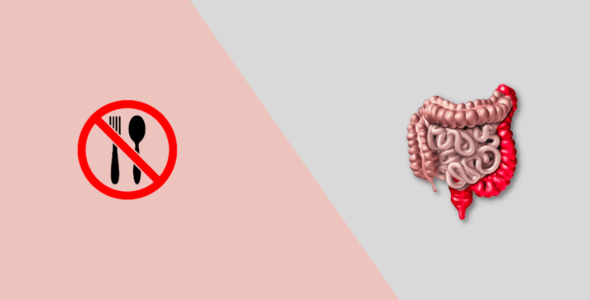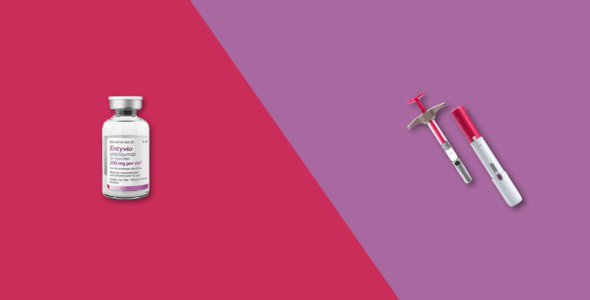Entyvio side effects and how to avoid them
Table of contents
Entyvio is a brand-name medication manufactured by Takeda Pharmaceuticals U.S.A., Inc. It is classed as a monoclonal antibody and is used to treat active ulcerative colitis and Crohn’s disease. While Entyvio is generally well tolerated, there are some potential side effects that people should be aware of. The most common side effects of Entyvio include joint and back pain. Less common, but more serious side effects, can include serious allergic reactions.
Learn more about the side effects of Entyvio and what you can do to avoid them.
What is Entyvio (vedolizumab)?
Entyvio is a medicine prescribed to adults to treat moderate to severe Crohn’s disease and ulcerative colitis. It’s usually prescribed when another medicine hasn’t worked well enough or wasn’t well tolerated. There’s no permanent cure for either condition, but they can be managed with medications like Entyvio. It can help reduce the severity of your symptoms and prevent flare-ups.
The active ingredient in Entyvio is called vedolizumab, which is a biologic. It is a type of drug called a monoclonal antibody that reduces inflammation in your gastrointestinal system. When you take Entyvio, vedolizumab is released into your gastrointestinal system. It attaches itself to areas on the surface of your gut cells called integrin receptors.
Usually, when integrin receptors are stimulated by other molecules in your body, they trigger inflammation, but when vedolizumab binds with the integrin receptors it stops other molecules from stimulating them. This reduces how much inflammation occurs in your gastrointestinal system.
Entyvio dosage
Entyvio is available as an injection: 300 mg vedolizumab in a single-dose vial. Entyvio is injected into a vein in your arm using an intravenous drip (intravenous infusion). A doctor or nurse usually does this for you. How often you have intravenous infusions will be decided upon by your doctor based on your condition and medical history.
You are advised to read the medication guide provided with this medicine for the drug information and patient information, and always speak with your healthcare provider for medical advice about any changes to your dose so they can monitor and evaluate your condition.
What are the most common Entyvio side effects?
The most common side effects of Entyvio include:
- Headaches
- Itching
- Nausea (feeling sick)
- Tiredness
- Joint pain
- Back pain
- Pain in your hands and feet, and fingers and toes
- Fever
- Common colds
- Increased risk of infections of your nose and throat
- Sore throat
- Sinus infections
- Bronchitis
- Flu
Entyvio can cause more serious side effects, including:
- Serious allergic reactions to the medication can cause hives, swelling of your face and throat, heart palpitations, trouble breathing, and shortness of breath
- An increased risk of serious infections – tell your healthcare provider if you think you have an infection – symptoms may include fever, muscle aches, shortness of breath, runny nose, sore throat, skin sores, tiredness, or pain during urination
- Liver problems – symptoms include tiredness, loss of appetite, upper right side stomach pain, dark urine, or yellowing of the skin and eyes (jaundice)
- A rare but serious viral brain infection called progressive multifocal leukoencephalopathy (PML), particularly in people with an already weakened immune system
If you experience any of these serious side effects, stop taking Entyvio and seek medical attention immediately. You are encouraged to report negative side effects of prescription drugs to the FDA. Visit www.fda.gov/medwatch, or call 1-800-FDA-1088.
Entyvio drug interactions
Entyvio can interact with other medications including:
- Remicade (infliximab), Humira (adalimumab), Simponi (golimumab), and Stelara (ustekinumab)
- Live vaccines
- Tysabri (natalizumab), a tumor necrosis factor (TNF) blocker medicine that can weaken your immune system
- Any corticosteroid medicines
- Any other medications that can affect your immune system, like other immunosuppressants
Other medical conditions may affect your treatment with Entyvio so you should always seek medical advice from the healthcare professional prescribing your drugs. The drug information provided is intended for reference only and should not be used as a substitute for medical advice.
Entyvio warnings & precautions
Don’t take Entyvio if:
- Are allergic to the active ingredient vedolizumab
- Are allergic to any of the other ingredients in Entyvio
- Are under 18 years of age
Talk to your doctor before taking Entyvio if you:
- Have tuberculosis (TB) or have been in close contact with someone who has tuberculosis
- Currently have an infection
- Have any liver problems
- Have recently had a vaccine or due to having a vaccine
- Are pregnant or are planning to become pregnant
- Are breastfeeding or are planning to breastfeed – This drug passes into breast milk
You should always check with your doctor or pharmacist before taking any medication, including Entyvio, to make sure it is safe for you.
When do Entyvio side effects start?
Side effects may appear almost immediately, in response to the infusion. Others may take several days, or weeks to appear. Entyvio will take up to 6 months to be completely cleared from your system and some side effects may continue to appear during this time.
Does Entyvio weaken your immune system?
Entyvio does not affect the whole of your immune system as it only works on your gut and not your whole body.
Is Entyvio a cure for ulcerative colitis?
Entyvio is not a cure for ulcerative colitis but will calm the inflammation. Your treatment and dose will be based on how severe your condition is.
Does Entyvio affect the brain?
Entyvio may cause progressive multifocal leukoencephalopathy (PML), a potentially life-threatening infection that affects your brain.
How long do Entyvio side effects last?
Entyvio will stay in your system for up to 6 months after your last dose, so side effects may continue during this time.
Are there Entyvio side effects that last forever?
Side effects may last for up to 6 months after the last dose of Entyvio. Mild side effects will go away on their own, or after a slight change to your dose.
Is weight gain a side effect of Entyvio?
No, weight gain is not a side effect of using Entyvio.
How long do you stay on Entyvio?
Entyvio is a long-term treatment if your doctor decides that Entyvio is safe for you. If your symptoms do not reduce after 14 weeks of treatment, your doctor may stop you from taking the drug.
Is it hard to digest the food you eat while on Entyvio?
Entyvio will not affect how the food you eat is digested but foods high in insoluble fibers, lactose, and sugars can all cause unpleasant symptoms of ulcerative colitis. Speak to your dietitian for advice on healthy food options if you are being treated for this condition.
Does Entyvio cause hair loss?
No, hair loss is not a known side effect of Entyvio, but hair loss is common in people with (IBD). Other medications used to treat IBD may also cause hair loss. Talk with your doctor if you have concerns associated with hair loss.
What are the long-term Entyvio side effects?
Entyvio may cause long-term side effects such as progressive multifocal leukoencephalopathy, joint pain, and liver problems. Talk to your doctor if you develop for medical advice if you develop any of these side effects.
Does Entyvio cause cancer?
Cancer is not a side effect of using Entyvio. Patients taking this medication do not have an increased likelihood of developing cancer.
What is the best way to keep Entyvio side effects at a minimum?
The best way to avoid side effects is to take Entyvio as directed by your doctor. Follow your doctor’s instructions carefully and do not take more or less than prescribed.
If you experience any side effects, talk to your doctor or pharmacist. They may be able to recommend ways to help reduce or prevent some of the side effects.
1. Stick to the recommended dosage
Take your prescribed dose of Entyvio that has been recommended by your healthcare professional. Do not take more or less than prescribed.
2. Monitor your blood sugar levels
If you have diabetes, it is important to monitor your blood sugar levels closely while taking Entyvio. Check your blood sugar levels as directed by your doctor and report any changes to your doctor immediately.
3. Drink plenty of fluids
Drink eight to 10 glasses of water or fluids every day to help prevent dehydration, which can make side effects worse.
4. Avoid alcohol
Alcohol is not known to interact with Entyvio. But alcohol may make symptoms of inflammatory bowel disease worse.
5. Don’t skip meals
Eating regular meals and snacks will help to prevent low blood sugar levels (hypoglycemia).
6. Check your feet
If you have diabetes, check your feet regularly for any cuts, sores, or redness. Tell your doctor if you experience any problems with your feet while taking Entyvio.
7. Know the signs and symptoms of Entyvio side effects
Signs and symptoms of side effects may include serious allergic reactions. If you experience any of these symptoms speak to your doctor for medical advice immediately.
8. Tell your doctor about all medications you’re taking
Be sure to tell your doctor about all other medications you’re taking, including over-the-counter drugs, vitamins, and herbal supplements, as they can interact with Entyvio.
9. Get regular medical check ups
It is important to get regular medical check ups and monitor your medical conditions. Your doctor will monitor your side effects and may adjust your dose of Entyvio as needed.
Medically reviewed
A medical professional has reviewed this article.


Jamie Winn, PharmD
Jamie Winn, PharmD
Dr. Jamie Winn received his Doctor of Pharmacy in 2002 from the University of South Carolina College of Pharmacy, Columbia, SC. Jamie is a medical reviewer for NiceRx.



